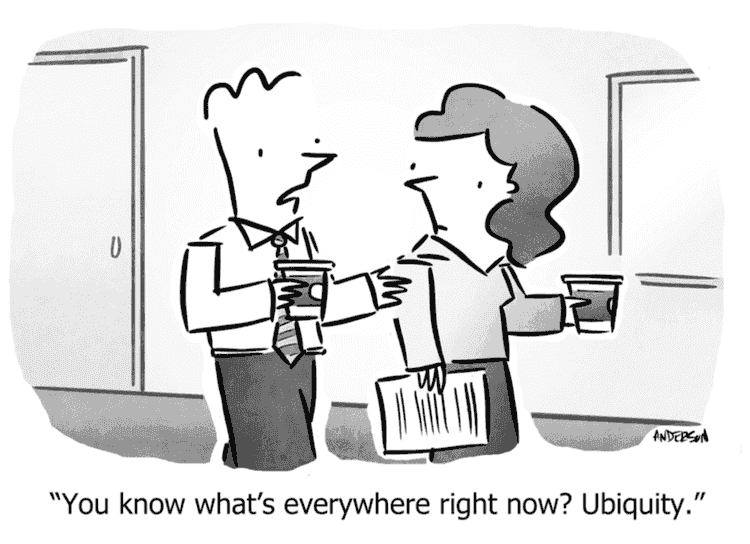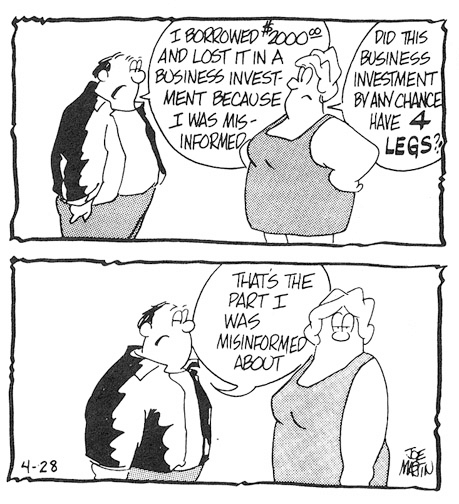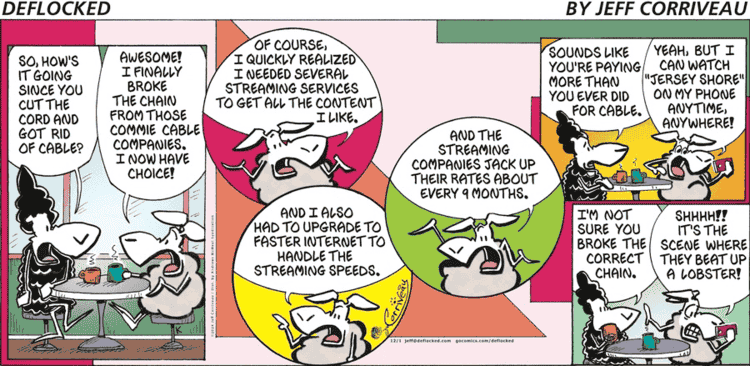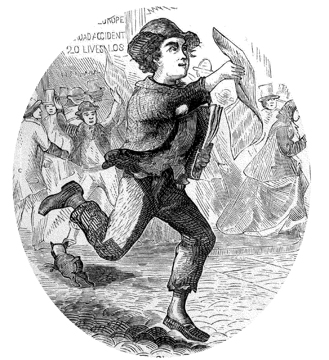CSotD: Media Literacy on the Funny Pages
Skip to comments
Andertoons (AMS) takes a daring step, making a joke based on the reader having a good vocabulary, but which is funnier if the reader has just enough of a good vocabulary to know what the word means and to feel somewhat proud of that.
That is, if ubiquitous/ubiquity were more common words, there’d be nothing funny here.
As it happens, I remember when I learned it: I was in my mid-teens and Time Magazine had a reference to John Mitchell’s ubiquitous pipe. I’d seen the word a few times before but this time decided to find out what it meant and looked it up.
I put it in my warchest, but haven’t used it terribly often because it’s a good word but a bit obscure, which is what makes it fun here. It’s hardly ubiquitous.

By contrast, the laugh in this Mr. Boffo is that she has no idea what he’s trying to say nor does she care a whole lot, which is part of his problem.
Joe Martin has a talent for the ridiculous, which motivates me to include one of my very favorite Willy ‘n Ethels:


Over at Between Friends (KFS), Kim is struggling with her novel, and I can relate. She’s a good writer and makes a living at it, but the novel doesn’t seem to be coming together and she’s not sure why.
Maeve isn’t terribly helpful. For one thing, you can’t just send an unsolicited manuscript to an agent. You have to approach them first for permission. But you can send it to a publisher, where it will go into what is known as the “slush pile” and sit there for a few months until some intern pulls it out, reads the first few pages and sends it back with a form letter rejection.
Every once in awhile, a manuscript makes it out of the slush pile and is published.
But also every once in awhile someone submits a published work and gleefully counts up the rejections it gets. Someone once submitted Faulkner’s “The Reivers” as an unsolicited manuscript and only one publishing house recognized it. The rest turned it down, though I’m not sure Faulkner was a fair test, since his prose is a bit turgid.
The problem is that form letters, and the occasional “we like the characters but the story doesn’t seem compelling” comments don’t tell you what’s wrong with it. However, if they don’t ask you to try again, they don’t want you to try again.
I broke the cycle by writing to a fellow who had savaged a very similar-sounding book in the NYTimes Book Review and asking him to do the same for me.
He agreed and sent back five pages of single-spaced criticism picking it apart in such detail that, at one point, he wrote “this is making my teeth hurt” not about my writing but his own.
And he was right. I could nit-pick a point or two, but he nailed it, and I realized that while I’m a very good writer, I have no talent for writing novels. Fortunately, in the several years of struggle, I’d picked up a fair amount of freelance journalism work, enjoyed it, was good at it, and made money from it.
So I moved on and spent the next 40 years doing something that worked.
However, I had to go through the process in order to get there, and perhaps Kim does, too.
Or perhaps she’ll become a famous best-selling author, which would both defy probability and ruin the strip. Struggle is a much better story.

The other day, I mentioned my confusion over the difference between cable and streaming, and someone pointed out that cable goes to everybody while streaming allows advertisers to tailor commercials more directly. Which is true, except that they all think I live in Rhode Island.
But today’s Deflocked (AMS) is more aligned with my confusion, because I get YouTube TV through T-Mobile, which is no different than what I got on cable except for no wire and the Rhode Island thing.
However, here we learn that linear TV means they show things on a schedule while Over-The-Top lets you watch anytime. I get a combination of that, because YouTube offers some OTT but also allows for time-shifting linear programming with a single click and ample storage. I’ve currently got more than 50 movies recorded from TMC and awaiting my pleasure.
Going by Mamet’s experience, I gather people in cities are getting their local stations through the air (We’re too remote for that) and then subscribing to Hulu and Netflix and so forth and so on rather than an umbrella provider like Sling or YouTube.
And as she says, and he confirms, spending a lot more to get a lot less.
Seems like the good stuff is scattered among a lot of different services but Jersey Shore-level garbaje is readily available.
There’s progress!

And here’s a Rhymes With Orange (KFS) for the inevitable people who pop up to announce that they don’t have a television. Which is an acceptable media choice, of course.
For my part, I’m a bit surprised there are still magazines. I get one or two because I subscribed to their online product and they begged me to please please please accept the magazine, too, so I do but I don’t actually read it.
I went to the ophthalmologist the other day, which always involves a lot of sitting around waiting, and there was a copy of the New Yorker, which at first I thought was missing some pages, but, no, that once fat little publication is down to about 70 pages. And costs $8.95, but then it’s always been full of ads for things I also couldn’t afford.
Not so full these days, I guess.
The comforting notion is that, while I feel bad for folks in the pressroom, the online world offers plenty of jobs for the writers and editors and formatting people and, yes, the cartoonists, too.

The discomforting notion is that newspapers are in worse shape because public radio can only do so much local reporting and the online national papers won’t tell you what the city council has planned for your next tax bill.
Not that what some of them tell you is all that helpful anyway.


Comments 7
Comments are closed.